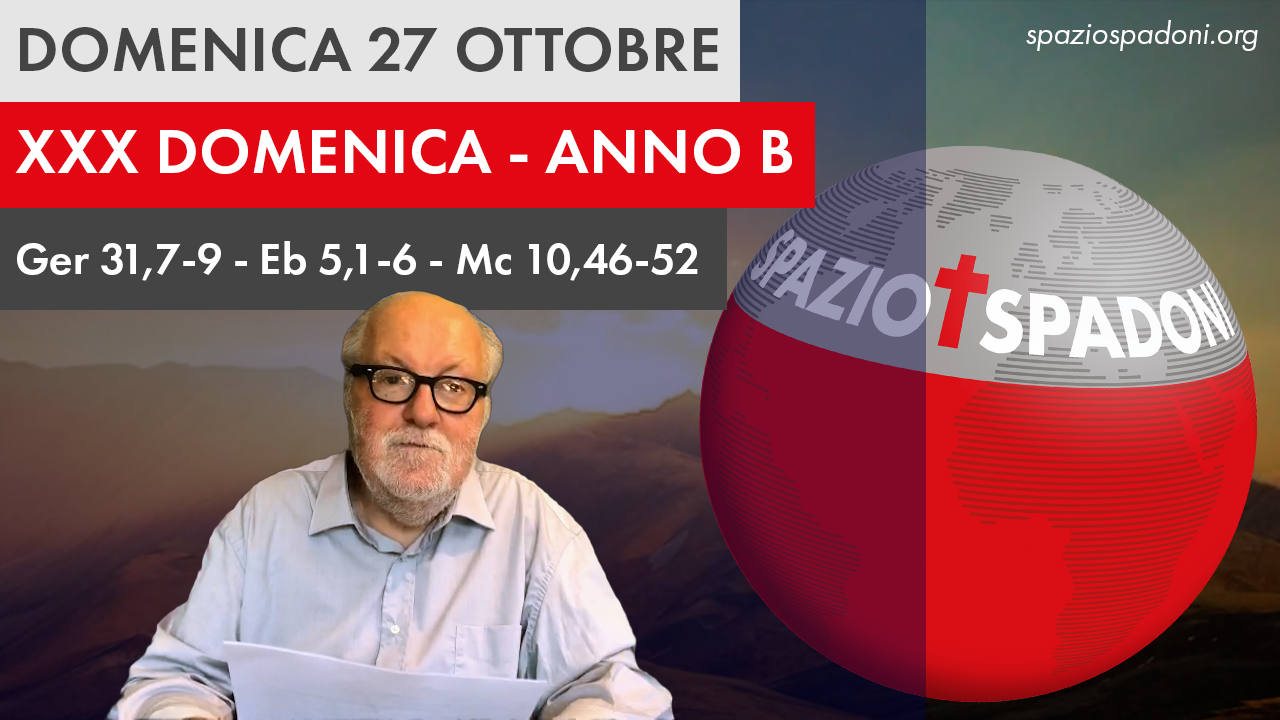
Sunday XXX Year B – Faith In Jesus Rips Through Our Darkness
Readings: Jer. 31:7-9; Heb. 5:1-6; Mk. 10:46-52
Just as the healing of the blind man of Bethsaida (Mk 8:22-26) preceded Peter’s confession (8:27-30) and the first announcement of the Passion (8:31-33), so the healing of the blind man of Jericho precedes the proclamation of Jesus as the King-Messiah by the crowds in Jerusalem (11:1-11) and the subsequent Passion of the Lord (14-15).
The blind man of Jericho calls Jesus “Son of David” (10:48), as do the crowds (11:10): this is a messianic title (2 Sam 7; Jer 23:1-6; 33:14-18; Zech 3:8; 6:12…) that appears 19 times in the Synoptics and never in John, and connotes a glorious, royal messianism; but Jesus is the suffering Messiah, who will give salvation only through the “scandal” of the Cross (1 Cor 1:23). To understand what will happen in Jerusalem, that is, the Lord’s Passion and Death, we need God to open our eyes (10:52), to make him able to accept the mystery of a salvation that comes through humiliation and the cross.
But in the healing of the blind man of Jericho, the faith journey of every man is also symbolized: without God’s light, each of us finds ourselves in a desperate situation, “blind, sitting by the wayside begging” (10:46). It is the situation of our world unable to find meaning in life, gripped by the darkness of anguish and fear, oppressed by misery and death; and we all beg life for some survival, dazing ourselves in entertainment, in the race for money, pleasure, power, alienating ourselves in a thousand frivolities: but in the end we find ourselves alone, at the magine of the road, in darkness…
But fortunately Jesus, the Savior prophesied by Jeremiah in the First Reading (Jer. 31:7-9), the only High Priest able to intercede for us (Second Reading: Heb. 5:1-6), “passes by” (Mt. 20:30): it is God who takes the initiative, who comes to meet our misery, who comes down from his heavens to rescue us. God hears man’s desperate cry for help, but man only senses his presence (“on hearing that there was Jesus of Nazareth”: 10:47).
The worldly powers, however, openly challenge man’s openness to God (“Many scolded him to keep him quiet”: 10:48): God is not there, and if he is there, he cannot hear you; it is useless to appeal to him… Perseverance, insistence, in seeking the Lord is therefore necessary, without allowing ourselves to be discouraged (“but he cried out louder”:10:48).
Jesus “stops” (10:48) beside the man; he does not, however, call him directly, but through the Church (“Call him!”:10:48): the Church has the task of bringing a proclamation of salvation that is not its own, but has been entrusted to it, and it must not intimidate men but make them “courageous” (10:49) in seeking the Lord.
We the blind are therefore called to conversion: it is necessary that we cast off our cloak (10:50), that is, that “we strip off the old man with the former conduct, the man who is corrupted behind deceiving lusts…, and clothe ourselves with the new man, created according to God in righteousness and true holiness” (Eph. 4:22-24); it is necessary that we rise inwardly (“leapt up”:10:49), and that we go in faith to Jesus (10:49,52).
Then we are asked for the ultimate commitment: faced with the same question as Jesus (“What do you want me to do?”:10:36,51), James and John had asked for a glorious place, the blind man, a type of the true disciple, asks instead for the light of God, the understanding of the mystery of salvation. And “at once he regained his sight” (10:52): only God is the light that overcomes darkness (Gen 1:3, 18; Ex 14:20; Sl 27:1; 1 Jn 1:5…): only Jesus is “the true light, the one who enlightens every man” (Jn 1:9; cf. 3:19; 8:12): that we, too, know “at once . .. follow him on the way” (10:52), with readiness and enthusiasm like the miracle worker in Jericho, lest we deserve the condemnation of those who ‘preferred darkness to light’ (Jn 3:18-21)!
